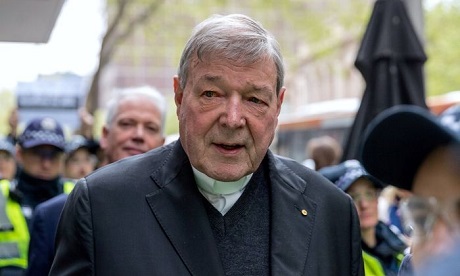The verdict on whether to overturn the conviction of Cardinal George Pell will come later, Australia’s highest court said on Thursday.
Pell is seeking to appeal the Victoria Appeal Court’s two-to-one decision last year that came down in favour of sustaining his 2018 child sexual abuse conviction.
Bret Walker, Pell’s lead barrister, outlined a case for appeal based on Victoria Justice Mark Weinberg’s findings.
Weinberg’s dissenting opinion found Pell was convicted on the evidence of a single alleged victim, despite the testimony in his favour of as many as 20 witnesses. The jury could not have found him guilty beyond reasonable doubt, Weinberg said.
In a dramatic move, Victorian Director of Public Prosecutions Kerry Judd QC shifted position on the timeframe for when Pell could have molested the boys in St Patrick’s Cathedral in Melbourne.
Instead of arguing that there was a five to six minute window of opportunity for offending, Judd said it could not be stated for certain how long the private prayer time lasted that, according to the prosecution case, ultimately created the chance for the cardinal to strike.
Judd told the full bench of seven judges that if there were a mistake, they should send the case back to the Victoria state Court of Appeal to hear it again.
Otherwise, the High Court should hear more evidence and decide itself whether the convictions against Pope Francis’ former finance minister should stand, Judd said.
Pell’s two-day hearing that ended yesterday and could be his last chance of clearing his name.
In the main, Pell was convicted on the testimony of just one of the choirboys, now in his 30s.
He first went to police in 2015 after the second victim died of a heroin overdose at the age of 31.
Judd told the court that the surviving victim’s detailed knowledge of the layout of the priests’ sacristy supported his accusation that the boys were molested there.
“Something has happened there in that room and it’s indelibly marked him,” Judd said. “Something significant happened in that room.”
Much of the two-day hearing focused on whether the jury should have had a reasonable doubt about Pell’s guilt and whether he could have time to molest the boys fully vested in multiple layers of clothing in five or six minutes immediately after a Mass.
Walker said what the court seemed to require was a “grotesque version of the reversal of the onus of proof if all the Crown has to do is to prove the possibility of something”.
To the contrary, Judd argued that the charges were proved beyond a reasonable doubt.
Melbourne Law School Prof. Jeremy Gans, who attended the High Court hearing, said later, “It’s been a very good day for Pell.”
Logistics
Walker told the Court sexual assaults on two choir boys were alleged to have occurred simultaneously for five to six minutes in the cathedral sacristy while Pell was wearing all his vestments after Mass.
Despite testimony that Pell routinely stood outside the cathedral door to greet Catholics after Mass, creating the possibility Pell was not at the scene of the alleged assault, this was unchallenged at the trial.
When justices asked about the vestments Pell wore under his chasuble, Walker explained Pell would have had to manoeuver them around while simultaneously assaulting the two boys.
Walker said multiple witnesses offered an alibi for Pell during the time the alleged assaults took place.
The sacristy would have been a “hive of activity” at the time of the first assault, he said.
Inconsistencies
Walker said there were changes and inconsistencies in the dates provided by the sole witness-accuser in evidence against Pell.
Firstly, prosecutors suggested the first assaults happened between August and the end of December 1996.
During the appeal in Victoria, Walker said the date given for the second alleged assault was not even supported by the victim’s own testimony.
Then he found the date was chosen simply as “the next time the prosecution could suggest that the archbishop was at Sunday Mass in the cathedral,” .
Reasonable doubt
Walker said Pell could have committed the assaults as described and the original jury could not have been persuaded beyond reasonable doubt of the cardinal’s guilt.
The Court of Appeal in Victoria should have found that reasonable doubt could not be, and was not, excluded by the jury in their decision to convict.
Questioning Walker about the relevance of the accuser’s credibility at the appeal stage, Justice Virginia Bell said it was not for the High Court to determine if the jury should have believed him or not.
Walker said it was not the accuser’s perceived credibility at issue, but that the accuser and the witnesses for the defence present conflicting accounts, creating reasonable doubt.
The prosecution presented its case yesterday.
Source
